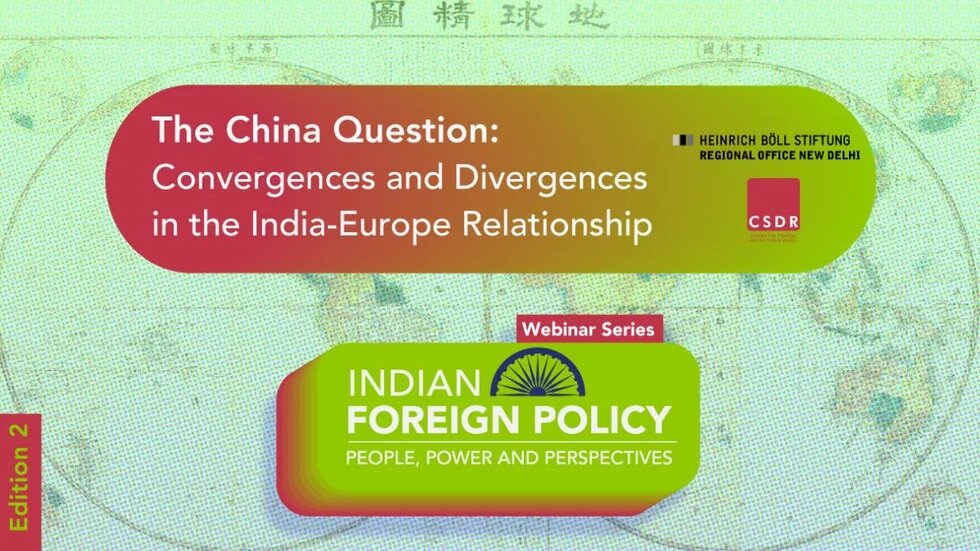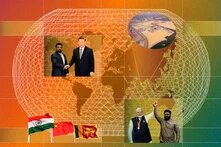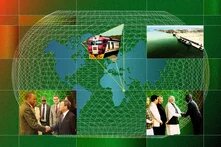This webinar explored the evolving dynamics between India, the EU, and China in a complex geopolitical landscape, where shifting alliances and strategic challenges shape the future of international relations.

The evolving triangular relationship between India, the European Union (EU), and China presents a complex geopolitical landscape. While India views China as a significant threat, the EU’s relations with China have also deteriorated. This webinar delved into the multifaceted dynamics of India-EU ties amidst their intricate interactions with Beijing and Moscow, highlighting key opportunities and challenges.
- For India, China remains the primary strategic challenge. The relationship has often simultaneously seen cooperation and rivalry, and has deteriorated significantly in the last four years, influenced by factors such as the COVID-19 pandemic, Russia-Ukraine war, and border tensions. India now asserts that relations will remain strained until the border situation normalizes, making a reset in the immediate future unlikely.
- India’s economic ties with China have ballooned in the last 20 years but are now witnessing adjustments to the realities of border tensions. Nonetheless, decoupling measures to reduce dependency on China have proven largely ineffective as trade has expanded rather than contracted in recent years. Similarly, the United States and the EU have recognized the challenges and potential drawbacks of decoupling, shifting in favor of de-risking and friend-shoring.
- Russia presents a complex challenge to strengthening India-EU relations and increasingly plays a role in New Delhi's approach to China. India is increasingly looking to shield itself from the sharpest consequences of the Russia-China convergence than drive a wedge.
- Perceptions over China have soured in Europe as well. And while Russia continues to be the primary existential threat to the EU, concerns about dependency and China’s aggressive external economic policies and role as an enabler of Russia’s war in Ukraine increasingly come to the fore.
- While divergences between the EU and India persist, enhancing their de-risking strategies towards Beijing while accelerating collaboration and most importantly operationalizing the India-EU relationship is essential.
- The narrative of China as a strategic threat to Europe has gained significant support, becoming popular within the EU and the continent is less fractured on the issue than widely perceived. However, we are likely entering a period with high potential for discord.
- The larger Eurasian bloc convergence (Iran, Russia, China, and North Korea) facilitated by Russia and China will apply more pressure on India and Europe - for India to align itself in a more neutral way and away from US-led projects and for Europe by raising costs for Western efforts against Russia and Iran.
- Given the unpredictable nature of a potential Trump presidency, his re-election poses a significant variable for the dynamics of various relations. There is a suggestion it could lead to increased dialogue and collaboration between India and the EU owing to mutual interest in preserving the stability of the US-led liberal and democratic system that prevailed after 1991.
- The Global South is also increasingly shifting away from Europe and gravitating toward Russia and China. European efforts towards standards setting are likely to run into higher diplomatic costs, especially with Middle powers in the Indo-Pacific.
- In this context, in the interest of maximizing EU-India economic ties, India must address several critical elements, including FTA (Free Trade Agreement) negotiations and the TTCs (Trade and Technology Councils) involving the UK and the EU. However, trailing manufacturing prowess continues to be a major obstruction in posing as a serious alternative to China.
- It is also essential that India integrate itself into the Indo-Pacific economic architecture, given that it is not a part of any major regional trading alliance. This lack of integration is concerning since it impedes the ability of India to participate in global supply chains and emerge as a leader in the Global South.
This discussion is part of The Indian Foreign Policy Webinar Series, offering an insightful and comprehensive examination of the emerging trends and strategic recalibrations defining India's role in the world today. For more information and to explore upcoming sessions, click here.


